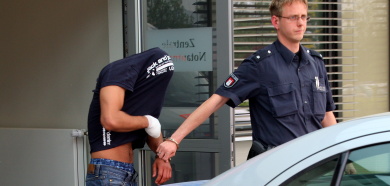The man was sentenced in March on an assault charge to one year and five months without possibility of probation, the Hamburg prosecutor’s office told German press agency DDP on Monday, confirming media reports.
The man had requested his March sentence be deferred, prosecutors said. He was notified in writing on Wednesday – a day before the stabbing – that the request had been rejected.
Police were also investigating earlier claims that he assaulted two of his sisters, including the girl stabbed last week.
Police arrested the man on Friday after the stabbing death of his 16-year-old sister early Friday morning in Hamburg’s Sankt Georg district. Neighbours and a passing group of youths heard the girl screaming near the Berliner Tor metro stop and called police at 11:21 pm on Thursday. The girl died about an hour later at the scene of the stabbing.
The girl’s oldest brother – like her a German citizen of Afghan origin – admitted to police he had killed her because she had turned away from her family, DDP reported. The family immigrated to Germany from Afghanistan 13 years ago, German news magazine Der Spiegel reported in its online edition.
The brother was charged in February with assaulting the 16-year-old girl and another of his sisters, DDP reported. Senior prosecutor Rüdiger Bagger denied reports that the man had already been sentenced in that case, saying that it was still pending.
The girl’s cousin, Mujda O., told Der Spiegel‘s television unit that the 23-year-old had been getting into fights every two weeks.
“If you were to call this an honour killing, you would be correct. Very correct,” the girl, who was not identified with her last name, told Der Spiegel.
A series of six honour killings in Berlin – including the shooting at a bus stop of 23-year-old Turkish woman Hatun Sürücü – shook Germany in 2005. Sürücü’s youngest brother, Ayhan Sürücü, later confessed to killing her because he did not approve of her Western lifestyle.




 Please whitelist us to continue reading.
Please whitelist us to continue reading.